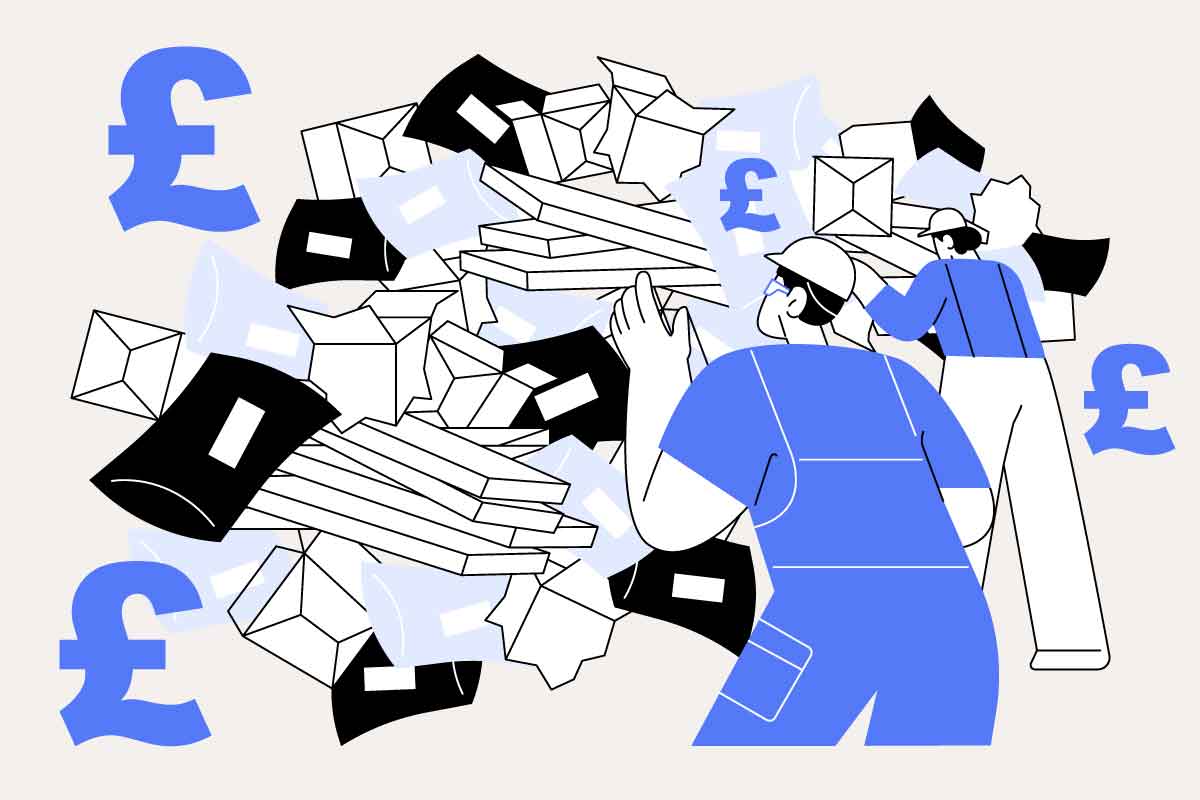Here we explain the cost associated with commercial waste collection and disposal, offering data for businesses aiming to optimise their waste management budgets.
In 2025, UK businesses face an evolving landscape regarding commercial waste collection and disposal. Stringent environmental regulations, the push towards sustainability, and economic factors are driving changes in how businesses manage their waste.
Overview of commercial waste in the UK
Commercial waste, also referred to as business or trade waste, includes waste produced from any commercial activity. In the UK, businesses are responsible for ensuring their waste is disposed of in a manner that complies with the Environmental Protection Act 1990 and the Duty of Care regulations. The responsibility extends to storing, transporting, and disposing of waste without harming the environment.
Factors influencing commercial waste collection and disposal costs
- Type of waste: Hazardous waste typically incurs higher collection and disposal fees due to the specialised handling and treatment required.
- Volume and frequency: The more waste a business produces, the higher the collection costs. Frequent collections can reduce the size of bins required but may increase overall costs.
- Location: Costs vary significantly across regions, with urban areas generally experiencing higher fees due to traffic and accessibility issues.
- Service provider: Prices can vary between providers; businesses may benefit from shopping around or negotiating contracts.
- Recycling practices: Implementing robust recycling strategies can reduce the volume of waste sent to landfill, potentially lowering disposal costs.
How much does commercial waste collection and disposal cost?
As of 2025, the costs for commercial waste services in the UK can vary widely depending on several factors mentioned above. Here is a breakdown of typical fees:
| Service Type | Cost Range per Bin Lift | Additional Notes |
|---|---|---|
| General Waste | £10 – £30 | Cost varies by waste type and bin size. Additional landfill tax applies. |
| Recyclable Materials | £5 – £15 | Lower costs due to the value of recyclables and less stringent disposal requirements. |
| Hazardous Waste | Starting at £50 | Costs increase based on treatment and disposal requirements. |
| Glass Waste | £5 – £20 | Often included in recyclables but may incur separate charges depending on purity. |
| Organic Waste | £8 – £25 | Includes food waste and other compostables. |
| Landfill Tax (Standard) | £98.60 per tonne | Applies to most general waste disposed of in landfills. |
| Landfill Tax (Lower rate) | £3.15 per tonne | Applies to less polluting wastes such as inert waste. |
| Plastic Packaging Tax | £200 per tonne | Charged on plastic packaging with less than 30% recycled content. |
- General waste: Collection costs for general commercial waste range from £10 to £30 per bin lift, with additional charges based on landfill tax rates and the type of waste.
- Recyclable materials: Collections are generally cheaper for recyclable materials such as cardboard, glass, and plastics, costing between £5 and £15 per bin lift.
- Hazardous waste: This includes materials like chemicals, oils, and electronic waste, with collection fees typically starting at £50 per bin lift, increasing based on specific disposal requirements.
Impact of regulations on waste management costs
The UK government’s commitment to environmental sustainability has led to an increase in landfill taxes and stricter regulations on waste disposal. These changes are designed to encourage waste reduction, reuse, and recycling. Businesses must adapt their waste management practices to these regulations to avoid hefty fines and potential reputational damage.
- Landfill tax: For 2025, the standard rate for landfill tax is £98.60 per tonne, while the lower rate for less polluting wastes is £3.15 per tonne.
- Plastic Packaging Tax: Introduced in April 2022, this tax applies to plastic packaging produced in or imported into the UK, featuring less than 30% recycled plastic, charged at £200 per tonne.
Strategies for managing and reducing waste management costs
- Waste audits: Regular audits can help identify the major sources of waste and opportunities for reduction or recycling.
- Negotiating contracts: Businesses can negotiate terms with waste management providers to secure better rates or services tailored to their specific needs.
- On-site processing: Investing in compactors or balers can reduce the volume of waste, thereby decreasing collection fees.
- Employee training: Educating staff on proper waste segregation and recycling can improve recycling rates and reduce contamination, which often leads to additional charges.
Conclusion – Understanding business waste disposal cost
Effective waste management is not only a regulatory requirement but also a crucial component of sustainable business practices. By understanding the detailed cost implications and actively engaging in reducing and managing waste, businesses can significantly reduce their environmental impact and achieve cost savings. This guide serves as a foundation for UK businesses to navigate the complexities of commercial waste management in 2025.
FAQ for commercial waste management cost
Commercial waste disposal costs in the UK typically range from £10 to £30 per bin lift, varying by waste type, volume, and location, with additional fees like landfill tax applicable.
Commercial waste collection costs in the UK generally range from £5 to £50 per bin lift, depending on the type of waste, volume, frequency, and specific service provider terms.
The primary factors that contribute to variability in costs include the type of waste (e.g., general, recyclable, hazardous), the volume and frequency of collections, geographical location, and the specific service provider. Costs can also fluctuate based on market conditions, such as changes in fuel prices or regulatory changes that affect landfill and recycling operations.
Businesses can reduce waste collection costs by implementing several strategies:
Increasing recycling efforts to decrease the volume of waste requiring disposal.
Optimising collection schedules to ensure bins are full at the time of pickup, thus reducing the frequency of collections needed.
Negotiating contracts with providers to obtain better rates or more suited services to the specific types of waste the business produces.
Investing in waste compaction equipment to reduce the volume of waste and potentially the frequency of collections.
Businesses should consider several potential additional fees:
Rental fees for waste bins or specialised equipment.
Excess weight charges if bins are overfilled or contain denser waste than anticipated.
Contamination fees if recycling is contaminated with non-recyclable materials, leading to additional sorting and processing costs.
Special handling fees for hazardous materials that require specific disposal methods.
The Plastic Packaging Tax affects businesses that manufacture or import plastic packaging with less than 30% recycled content. The tax is charged at £200 per tonne and aims to encourage the use of recycled materials in plastic production. Businesses involved in packaging should consider the potential financial impacts of this tax and explore ways to increase the use of recycled plastics to mitigate these costs.
The landfill tax is designed to encourage waste reduction and the diversion of waste from landfills to more sustainable disposal methods such as recycling. The tax increases the cost of disposing of waste in landfills, which can significantly impact businesses that produce large volumes of non-recyclable waste. The current rates are £98.60 per tonne for general waste and £3.15 per tonne for qualifying materials, pushing businesses to adopt more efficient waste management and recycling practices to avoid these costs.

